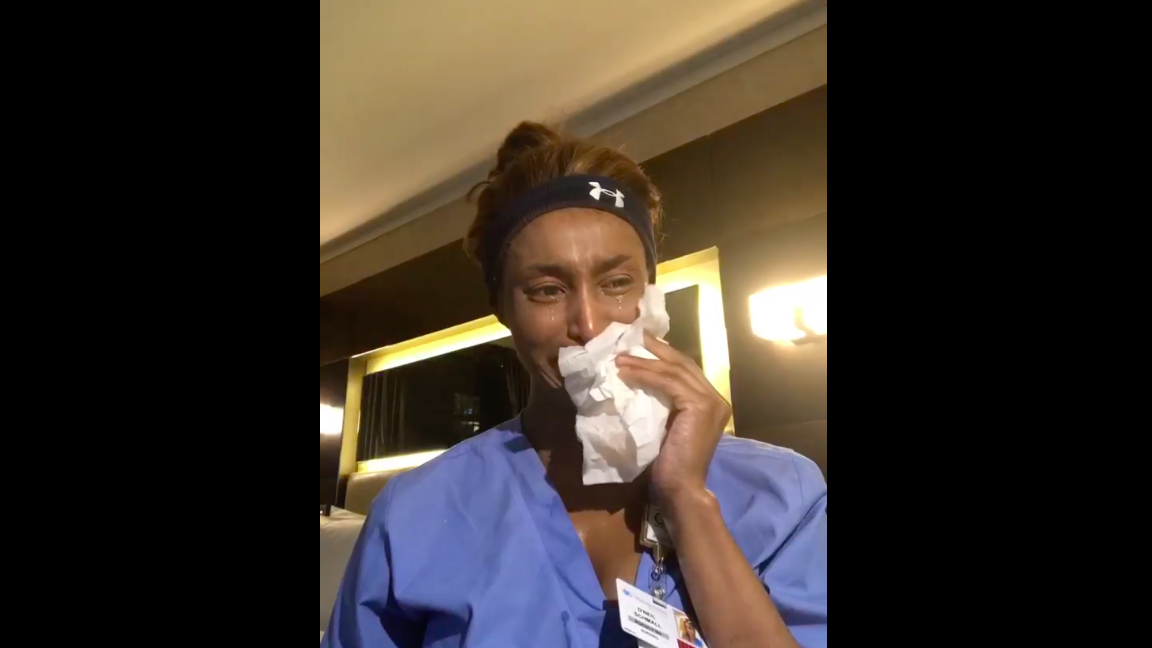A nurse on the frontlines of the coronavirus outbreak in New York City broke down as she struggled to describe her “worst shift” via an Instagram video Tuesday.
According to the New York Post, D’neil Schmall first arrived in Manhattan from Washington D.C. last month to treat COVID-19 patients at the makeshift hospital set up in Central Park. In the video, she details how the impact from the lives lost to the pandemic has taken an exhaustive toll on first responders.
“I don’t know, I just feel like there’s only so much anyone can take,” Schmall said in the video. “I’m tired of walking into rooms and your patient’s dead. You just walk into a room, and there’s a dead body there. I’m tired of calling families and telling them that news.”
The nurse, whose social media accounts list her as a personal trainer and former bodybuilder, talked about how devastated she was for her peers and other healthcare workers. She said she posted the footage to reveal what nurses and others in the healthcare industry have to deal with, including shifts twice as long as normal and shortages in protective resources.
“I just feel like people think just because we’re like a healthcare worker that we are somehow immune to this, and we’re not,” she said. “I cried the whole way home in the Uber tonight … and the driver was like, ‘Ma’am, are you OK?’ I don’t think people understand how stressful this job is. I was trained for anything in the world, but this is so stressful.”
As hospital beds across the country are filling up with COVID-19 patients, Schmall said nurses are being asked to overcome tremendous circumstances while also trying to protect their health. She said someone needs to be more vocal about the truth behind the matter.
“How can I take care of 14 people when I have one tech and they have 30 patients,” she said. “I just feel like someone should put raw emotions out there about what the f**k is going on here.”
"The heightened sense of social isolation meant to combat the spread of the disease is especially tough on first responders at this time," Schmall said.
“I feel like I have no one to talk to,” she continued. “I can’t call my mom because then she’ll be worried about me, she never wanted me to come here from the beginning. I can’t call my sisters ‘cause I don’t want to stress them out.”
Schmall suggested that hospitals bring in more resources like counselors to help staff members who are overwhelmed by the trauma of treating COVID-19 patients.
“I have friends that are nurses and I’m pretty sure that they understand but they are going through the same thing,” she said. “So the end result is you end up crying in your hotel room. Or in the bathroom. There is no one to talk to.”
On Saturday, CNN shared an op-ed from medical analyst and contributor Kent Sepkowitz to try to explain why New York has been the epicenter of the disease.
He said the disease is killing New Yorkers disproportionately, with 42% of the more than 20,000 deaths occurring in New York. The mortality rate in the state is 4.7%, compared to 3.4% nationally, according to data from the Johns Hopkins University Center for Systems Science and Engineering.
Sepkowitz notes that the epidemic has been present in New York City a week or two longer than many other places, writing that “a more mature epidemic is always a larger epidemic.”
But the root cause of the high mortality rate, according to Sepkowitz, is the “chronically inadequate” health care accessible to minorities and poor people throughout New York. Unfortunately, this disparity is also being mirrored in other major cities around the country like Chicago and New Orleans, as Blavity previously reported.
HBCUs are facing many challenges managing coronavirus responses and need your support. Donate to the UNCF fund today to help students impacted by the pandemic.
